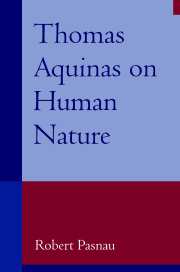Book contents
- Frontmatter
- Contents
- List of Abbreviations
- Acknowledgments
- A Note to the Reader
- Introduction
- PART I ESSENTIAL FEATURES (QQ75–76)
- 1 Body and soul
- 2 The immateriality of soul
- 3 The unity of body and soul
- 4 When human life begins
- Excursus metaphysicus: Reality as actuality
- PART II CAPACITIES (QQ77–83)
- PART III FUNCTIONS (QQ84–89)
- Epilogue: Why Did God Make Me?
- Notes
- Bibliography
- Appendix: Outline of the Treatise (ST 1a 75–89)
- Index
Excursus metaphysicus: Reality as actuality
Published online by Cambridge University Press: 05 June 2012
- Frontmatter
- Contents
- List of Abbreviations
- Acknowledgments
- A Note to the Reader
- Introduction
- PART I ESSENTIAL FEATURES (QQ75–76)
- 1 Body and soul
- 2 The immateriality of soul
- 3 The unity of body and soul
- 4 When human life begins
- Excursus metaphysicus: Reality as actuality
- PART II CAPACITIES (QQ77–83)
- PART III FUNCTIONS (QQ84–89)
- Epilogue: Why Did God Make Me?
- Notes
- Bibliography
- Appendix: Outline of the Treatise (ST 1a 75–89)
- Index
Summary
The first four chapters have each hinted at a deeper metaphysics that I believe lies implicit in Aquinas's thinking about human nature. On this deeper picture, all there is is actuality of various kinds. Material beings are not composites of actuality plus some kind of elusive stuff known as matter, they are instead just composites of certain sorts of actuality. Reality is actuality all the way down, and substances are bundles of actuality, unified by organization around a substantial form.
All actuality derives its existence from God. “The first completely perfect actuality, which has in itself the whole fullness of perfection, causes actual existence in all things” (QDSCic). The physical world is one manifestation of actuality, but there are other manifestations, nonphysical ones. Different forms of actuality exist at various removes from God. Those that are closest are the spiritual substances, the angels. The more things become material, the less actuality they possess. Prime matter is “the most incomplete of all beings” (ibid.); this is the external limit to being, since prime matter has no existence and no actuality at all. To ascribe matter to some being is not to say that it has actuality plus some additional stuff, its material stuff. Instead, to be material is to be actual in a certain limited, inferior way. Matter is no more than a particular manifestation of actuality: complex actuality in motion, subject to alteration, generation, and corruption.
Prime matter is therefore just a logical abstraction, asymptotic to the curve of being.
- Type
- Chapter
- Information
- Thomas Aquinas on Human NatureA Philosophical Study of Summa Theologiae, 1a 75-89, pp. 131 - 140Publisher: Cambridge University PressPrint publication year: 2001



